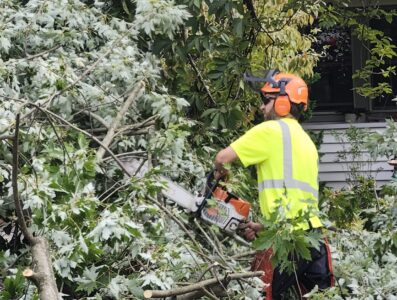Hearing brings testimony from educators on workforce development

How do you prepare students, today, who will face a jobs’ market influenced by not only an ever-changing landscape but also the possibility that the careers they seek may become obsolete due to Artificial Intelligence (AI)?
Those were just some of the concerns touched on at the hearing conducted by the state’s Senate Majority Policy Committee and hosted by state Sen. Gene Yaw, R-Loyalsock Township, and state Sen. Dave Argall, R-Rush Township, at Lycoming College this week.
Aimed at learning about ways to strengthen the relationship between education and workforce development, the hearing brought together leaders in higher education, students and business and labor union representatives to discuss what legislators can do to facilitate a better partnership for the two.
With the state population declining and a larger section aging out of the workforce, Pennsylvania is facing a shortage of workers to fill the jobs that are available.
Encouraging students to get their education here and then enter the workforce here is critical, it was pointed out by the participants at the hearing,
Dr. Charles W. Edmonds, the new president of Lycoming College, led off the panel composed of educators and spoke about the “complexity of the learning objectives required and the essential and underpinning characteristics needed for jobs of today and especially tomorrow.”
“In Pennsylvania we must build and support an educational system that attends to this complexity and ensures that we provide the right messages and funding streams for both the short and long term economic objectives of our Commonwealth,” Edmonds said.
“We cannot think of our system as a simple math problem that can be solved with addition and
subtraction, but instead a calculus equation that has the capacity to interpret and recognize the incredibly diverse set of talents, abilities, educational attainment, levels and academic disciplines needed to ensure a durable workforce over decades, not just months and years,” Edmonds said.
In his opening statement, Yaw noted that the two local colleges, Lycoming and Penn College, had “two different orientations” for addressing the issue of workforce development.
Dr. Michael J. Reed, president of Penn College, then offered ways in which the college addresses workforce development.
“Our goal is simple. It’s to place our students in the most competitive position for long term success, and we do this by working directly with industry leaders and offering directly what industry needs,” said Reed.
“Our educational reach is significant. We are impacting over 12,000 students annually. In addition to our 4,700 students thriving on campus, we also offer relevant dual enrollment classes to 2,100 high school students each year,” he continued.
Reed emphasized that Penn College’s approach relies heavily on hands-on learning.
“We have 150 industry standard labs across our campus, and they are well equipped and distinctive thanks to our industry partners. These labs are critical to our mission, because for every hour of lecture a student has, students spend three hours in labs to apply their learning. We prepare students through intensive hands-on work that builds conceptual understanding, confidence and skill,” Reed said.
Although the two colleges offer different approaches, they are not mutually exclusive in their view of educating the workforce of the future.
There is a partnership between the two schools which allows students from either college to take classes at the other.
“Penn College and Lycoming College are very different from the outside looking in. However, there’s so many unique opportunities, and we have a partnership where students at Penn College can take courses at Lycoming College. Lycoming College students could take courses here to continually help build and maximize their approach in different areas based on our wide range of different offerings,” Reed said.
Addressing the elephant in the room for future jobs’ markets-AI-Edmonds noted the importance of learning skills that cannot be automated.
“Higher education must be dynamic in the ways it responds and adapts to the needs of our economy and workforce. Beyond the classroom, we must teach the soft skills that our employers consistently ask us to produce, things like critical thinking, grit, pragmatism, resilience, the ability to work well with teams, strong communication skills, effective problem solving and educational experiences that equip our graduates and members of the workforce to be curious about seeking the answers to questions that we do not yet know. These skills are the backbone of innovation and economic growth,” Edmonds said.
“Penn College Workforce Development provides non-degree programming that supports workforce recruitment, up-skilling and certification across sectors like manufacturing, plastics, health sciences, energy efficient, building trades and transportation. Our custom training apprenticeships and pre apprenticeships are directly tied to Pennsylvania’s evolving labor and industry needs,” Reed said.
He also referred to the emergence of data centers to support the growing technology industry, noting that the construction and operation of the centers depends on the expertise of many of the disciplines at the college.
“We look at what’s surfacing right now, what was previously mentioned about the data centers, and you look at the degrees that we offer in power generation, electrical networking, heavy equipment, HVAC, and welding and how well we are aligned to support this industry,” Reed said.
“It’s about 70 percent of the jobs we’re preparing those graduates for right now within this next evolution of skill,” he added.
Also on the panel of educators was John Yudichak,J president of Luzerne County Community College. He cited the need for developing an energy infrastructure to support economic growth.
“If we do not build out our energy infrastructure, you do not have an economy, you don’t have hospitals, you don’t have educational institutions, you don’t have the industry, the manufacturing — so absolutely, energy is foundational to the economy,” Yudichak said.
Noting the importance of drawing in students that may have been told that they were not suited for the traditional college path, he said, “They’re going to be the plumbers, HVAC electricians that build the next revolution in the AI revolution in this country.”
Aaron Riggleman, manager of Government Affairs, PA Chamber of Business & Industry, stressed the need to attract students to study, work and stay in the state long term in order to increase the pipeline of workers. He noted that the Grow PA scholarships from the state are not just for in-state students.
“Those aren’t just for in-demand careers for students that are in Pennsylvania. It also helps attract students from other states. Give them a commitment to stay here in Pennsylvania, because at the end of the day, higher education institutions are essentially four year auditions to 18 to 22 year olds on how great Pennsylvania can be, and that means giving them opportunities when they’re in college, but also just to show the assets we have here,” Riggleman said.
“And so streamlining that pipeline, I think, is a critical component grow PA is a good start, but we have a lot of work to do, and that includes also private sector led internship co-ops, allowing the private sector to drive internships and the opportunities for students to see what the real job market is like in the Commonwealth,” he said.
“But I think if we don’t start and double down our efforts now, we’re really going to miss some of that investment that could be happening here and should be happening here,” he added.



